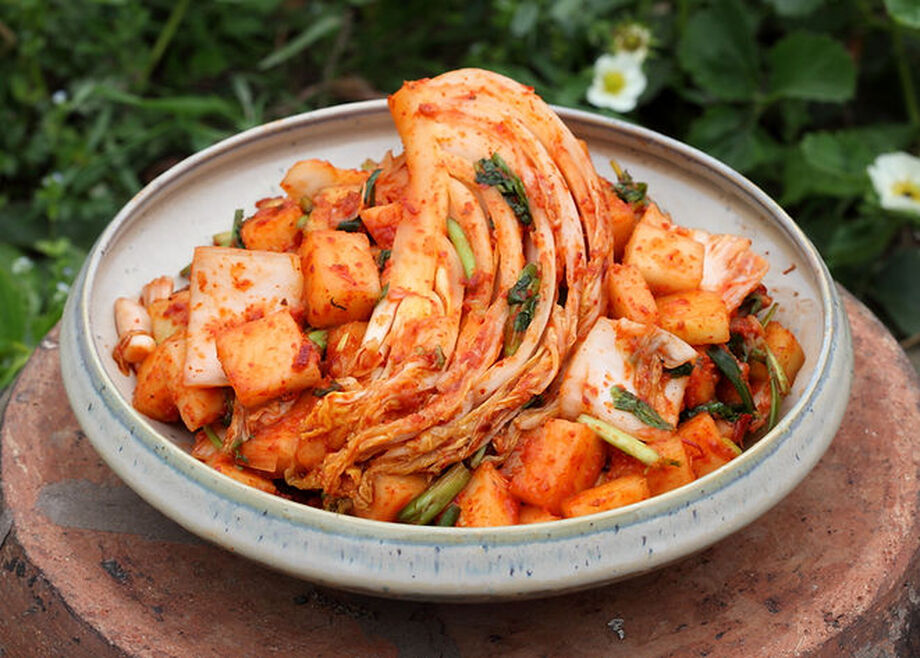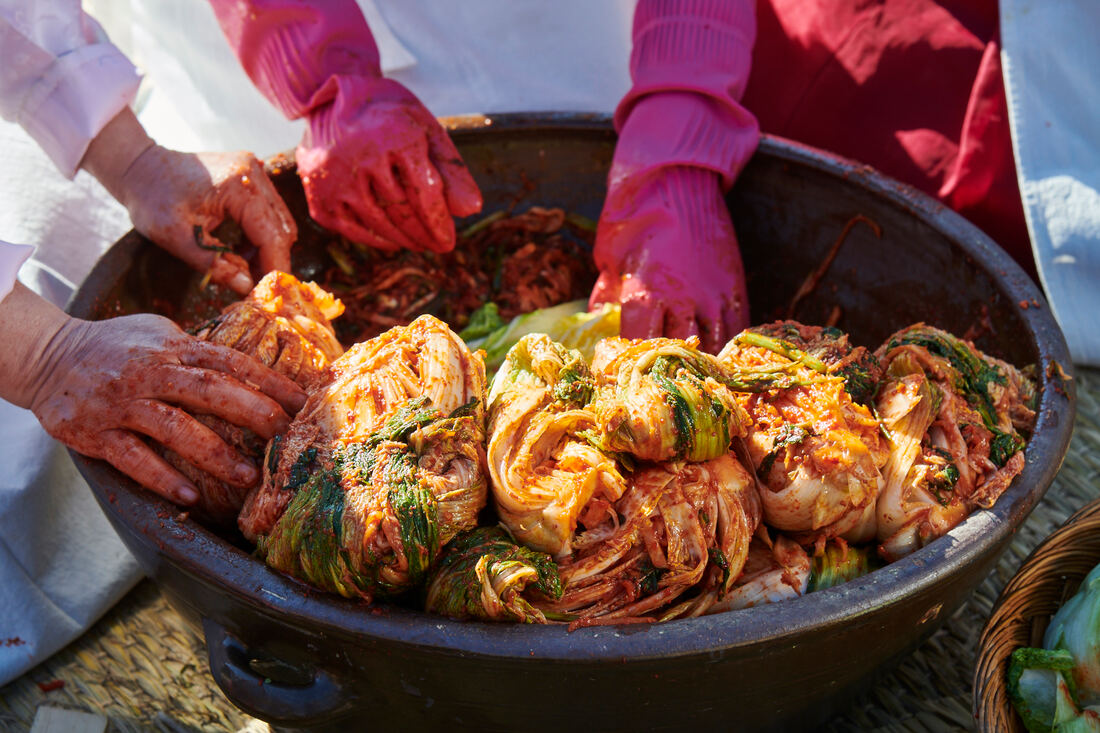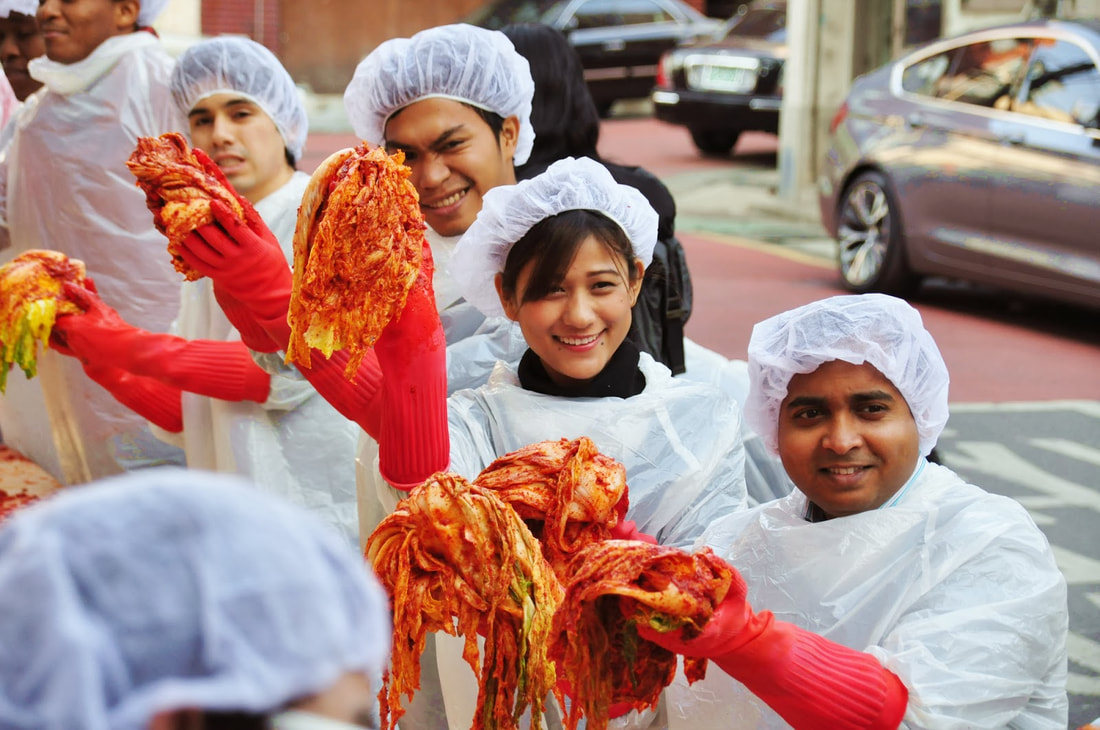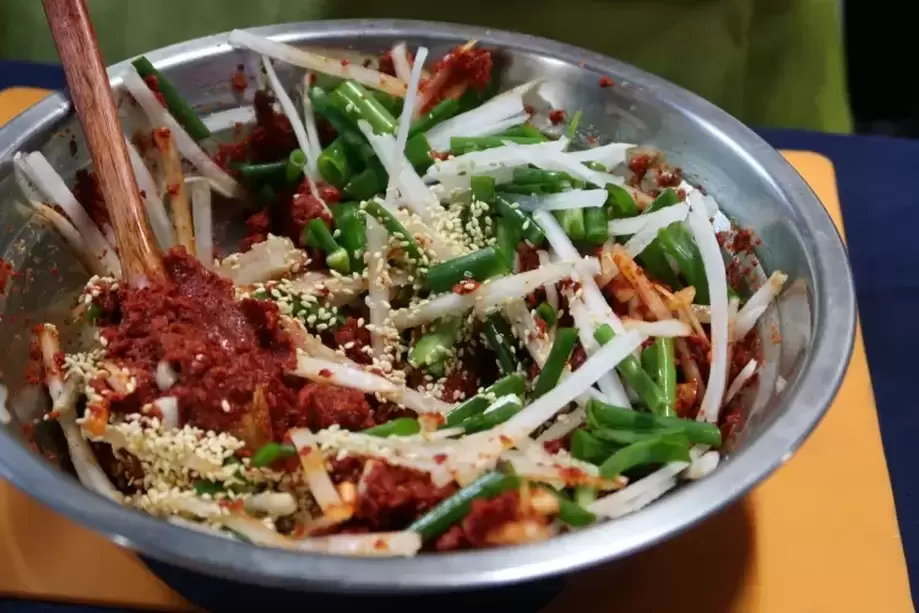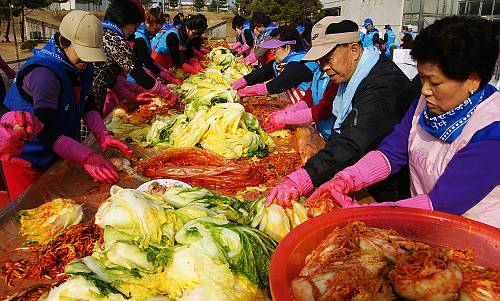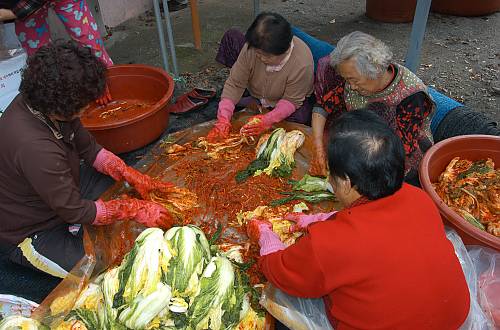- Home
- Process Worldview
- Community
- Art and Music
- Whitehead and Process Thinking
- Podcasts
- Spirituality
- Ecological Civilization
- Education
- Contact
- Social Justice
- Science
- Animals
- Sacred Poems
- Whitehead Videos
- Index of All Titles
- Practicing Process Thought
- Process Spirituality: A Spiritual Alphabet
- Recent Posts
Kimjang: An Eco-Practice from Korea
Following the Seasons, Preparing Food Together,
Cooperation, Teamwork, A Sense of Belonging
"Kimjang reminds people of harmony with nature while learning about the harmony of the ingredients resulting in fermented food, Kimchi. Since making and sharing Kimchi is a co-work, it needs cooperation and teamwork, which can be an opportunity to enhance solidarity in families or communities.
Jeong Hyun Ryu, a Korean English teacher living in Hanoi said : Kimjang often happens in a family, but it also happens among all the community members in a town. Since Kimjang is basically an event in which a lot of people should gather, people can communicate each other and they also can socialize while making Kimchi. Moreover, they can share each other the different ways of making Kimchi as well as the Kimchi made by other members of the community. So, we can say Kimjang is one of the important ways of promoting solidarity and providing a sense of belonging among the community members in Korea.
There is no specific date for Kimjang, but from the late fall to winter is the best season. Prior to the making, there are usually a lot of ingredients to prepare. The preparation follows a yearly cycle. In spring, households prepare shrimp, anchovies and other seafoods for salting and fermenting. In summer, they buy salt for the brine. In late summer, red chili peppers are dried and ground into powder. In the Kimjang season, communities collectively make and share large quantities of kimchi to ensure that every household has enough to sustain it through the long, harsh winter. Ryu explained the steps to making Kimchi : In traditional way, we salt Chinese cabbage first, and mix chili pepper powder, chopped garlic, fermented seafood and other ingredients needed to combine with the salted Chinese cabbage. When all the ingredients are mixed, we put Kimchi in the Kimchi jars and bury them in the ground in order to prevent freezing, and to keep the adequate taste for a long time. So Kimchi is fermented in the Kimchi jars. All the procedures making Kimchi is quite the same nowadays. However, as technology advanced, Korean people don’t usually use Kimchi jars but normally use Kimchi fridge which is special refrigerator for making Kimchi."
- The Kimjang Culture of Making and Sharing, The Voice of Vietnam
Jeong Hyun Ryu, a Korean English teacher living in Hanoi said : Kimjang often happens in a family, but it also happens among all the community members in a town. Since Kimjang is basically an event in which a lot of people should gather, people can communicate each other and they also can socialize while making Kimchi. Moreover, they can share each other the different ways of making Kimchi as well as the Kimchi made by other members of the community. So, we can say Kimjang is one of the important ways of promoting solidarity and providing a sense of belonging among the community members in Korea.
There is no specific date for Kimjang, but from the late fall to winter is the best season. Prior to the making, there are usually a lot of ingredients to prepare. The preparation follows a yearly cycle. In spring, households prepare shrimp, anchovies and other seafoods for salting and fermenting. In summer, they buy salt for the brine. In late summer, red chili peppers are dried and ground into powder. In the Kimjang season, communities collectively make and share large quantities of kimchi to ensure that every household has enough to sustain it through the long, harsh winter. Ryu explained the steps to making Kimchi : In traditional way, we salt Chinese cabbage first, and mix chili pepper powder, chopped garlic, fermented seafood and other ingredients needed to combine with the salted Chinese cabbage. When all the ingredients are mixed, we put Kimchi in the Kimchi jars and bury them in the ground in order to prevent freezing, and to keep the adequate taste for a long time. So Kimchi is fermented in the Kimchi jars. All the procedures making Kimchi is quite the same nowadays. However, as technology advanced, Korean people don’t usually use Kimchi jars but normally use Kimchi fridge which is special refrigerator for making Kimchi."
- The Kimjang Culture of Making and Sharing, The Voice of Vietnam
A Process Commentary
"Every year, Koreans all over the globe participate in kimjangs, working together to produce large batches of baechu kimchi to ensure an ample supply for long, cold winters."
The tradition of sharing is a sign of hope for a more humane, sustainable world: a world of Ecological Civilizations where people live with respect and care for one another and the larger community of life, with no one left behind.
Ecological Civilizations require large structural changes and a new mindset. We humans must imagine ourselves, not as isolated existents cut off from one another and the larger world, but as persons-in-community whose highest good is to live together, cooperatively, with one another and the more than human world. And we must develop economies and forms of education that embody this mindset in practical ways. See the work of EcoKorea (below) for more on this. Large structural changes begin with our appreciating small practices, undertaken by local people, that set the stage for the large ones.They are, as it were, eco-practices.
These practices are not simply means to larger ends; they are modes of spirituality in their own right: ways of being connected to one another, in neighborly ways, that touch a deep togetherness at the heart of the universe. Traditional Christians speak of this deep togetherness as the trinity of God: a relationality where persons are together yet unique, unique yet together. Kimjangs are an embodiment of the relational spirit.
They are signs of hope, too. Kimjangs transcend the callousness of linear economics, moving toward more circular economies where, in the words of Dr. Keunhwa Jung, "the social economy and the shared economy based on the local community become the main agents."* This is what the world needs today: shared economies in local communities that are good for people and good for the earth, and that live within the limits of the earth to absorb wastes and supply resources.
Kimjangs are good for children, too. They can easily be incorporated into early childhood education. Dr. Yunjeong Han explains that, n a just and sustainable world, education needs promote "cooperation rather than competition" and foster creativity and ecological literacy.* The very practice of kimjang, if done creatively as part of early childhood education, can foster that very cooperation, creativity, and ecological literacy, of which she speaks.
One thing for sure, the culinary outcome of the practice, kimchi, is delicious; and there's a powerful place for deliciousness in a just and sustainable world. In the spiritual alphabet used by the Cobb Institute (see below), "C" is for connection and "J" is for both justice and joy.
- Jay McDaniel, 8/13/2022
"Every year, Koreans all over the globe participate in kimjangs, working together to produce large batches of baechu kimchi to ensure an ample supply for long, cold winters."
The tradition of sharing is a sign of hope for a more humane, sustainable world: a world of Ecological Civilizations where people live with respect and care for one another and the larger community of life, with no one left behind.
Ecological Civilizations require large structural changes and a new mindset. We humans must imagine ourselves, not as isolated existents cut off from one another and the larger world, but as persons-in-community whose highest good is to live together, cooperatively, with one another and the more than human world. And we must develop economies and forms of education that embody this mindset in practical ways. See the work of EcoKorea (below) for more on this. Large structural changes begin with our appreciating small practices, undertaken by local people, that set the stage for the large ones.They are, as it were, eco-practices.
These practices are not simply means to larger ends; they are modes of spirituality in their own right: ways of being connected to one another, in neighborly ways, that touch a deep togetherness at the heart of the universe. Traditional Christians speak of this deep togetherness as the trinity of God: a relationality where persons are together yet unique, unique yet together. Kimjangs are an embodiment of the relational spirit.
They are signs of hope, too. Kimjangs transcend the callousness of linear economics, moving toward more circular economies where, in the words of Dr. Keunhwa Jung, "the social economy and the shared economy based on the local community become the main agents."* This is what the world needs today: shared economies in local communities that are good for people and good for the earth, and that live within the limits of the earth to absorb wastes and supply resources.
Kimjangs are good for children, too. They can easily be incorporated into early childhood education. Dr. Yunjeong Han explains that, n a just and sustainable world, education needs promote "cooperation rather than competition" and foster creativity and ecological literacy.* The very practice of kimjang, if done creatively as part of early childhood education, can foster that very cooperation, creativity, and ecological literacy, of which she speaks.
One thing for sure, the culinary outcome of the practice, kimchi, is delicious; and there's a powerful place for deliciousness in a just and sustainable world. In the spiritual alphabet used by the Cobb Institute (see below), "C" is for connection and "J" is for both justice and joy.
- Jay McDaniel, 8/13/2022
EcoCiv Korea
EcoCiv Korea works with partners in South Korea and around the world to promote a new paradigm for ecological civilization. Ecological Civilization envisions all human societies to embrace sustainable transitions for all life. The great human civilization achieved tremendous developments in human history on earth. However, there are some omits that our civilization left with ignorance and irresponsibility. The desire for unlimited developments and possessions led us to exploit and destroy nature beyond its point of resilience. All human civilization must take these warnings seriously and need to take a rapid and fundamental transition in how to live on earth as humans. The transition that we are envisioning is not limited in ecological studies or environmental movements. It would be about all aspects of collective human society as a civilization. We need a civilizational transitioning for the future. In order to achieve our vision the Institute for Ecological Civilization in Korea is sharing a vision by connecting with scholars, activists, governments, and politicians, in Korea and beyond.
EcoCiv Korea는 생태 문명의 새로운 패러다임을 홍보하기 위해 한국과 전세계의 파트너들과 함께 협력하고 있습니다. 생태 문명은 모든 인간 사회가 모든 생명을 위한 지속 가능한 전환을 포용하는 것을 구상합니다. 위대한 인류 문명은 지구상의 인류 역사에서 엄청난 발전을 이루었습니다. 그러나 우리 문명은 무지와 무책임으로 인해 남겨진 몇 가지 오점이 있습니다. 무한한 발전과 소유물에 대한 욕망은 우리로 하여금 자연의 회복력의 한계를 넘어 자연을 착취하고 파괴하게 만들었습니다. 모든 인류 문명은 이러한 경고를 심각하게 받아들여야 하며 인간으로서 지구에서 어떻게 살아야 하는지에 대한 신속하고 근본적인 전환을 할 필요가 있습니다. 우리가 구상하고 있는 전환은 생태학 연구나 환경 운동에 국한되지 않습니다. 그것은 하나의 문명으로서의 집단적인 인간 사회의 모든 측면에 관한 것입니다. 우리는 미래를 위한 문명의 전환이 필요합니다. 한국 생태 문명 연구소는 이러한 비전을 달성하기 위해 국내 외 학자와 시민 운동가, 정부, 정치인과 연계하여 비전을 공유하고 있습니다.
EcoCiv Korea는 생태 문명의 새로운 패러다임을 홍보하기 위해 한국과 전세계의 파트너들과 함께 협력하고 있습니다. 생태 문명은 모든 인간 사회가 모든 생명을 위한 지속 가능한 전환을 포용하는 것을 구상합니다. 위대한 인류 문명은 지구상의 인류 역사에서 엄청난 발전을 이루었습니다. 그러나 우리 문명은 무지와 무책임으로 인해 남겨진 몇 가지 오점이 있습니다. 무한한 발전과 소유물에 대한 욕망은 우리로 하여금 자연의 회복력의 한계를 넘어 자연을 착취하고 파괴하게 만들었습니다. 모든 인류 문명은 이러한 경고를 심각하게 받아들여야 하며 인간으로서 지구에서 어떻게 살아야 하는지에 대한 신속하고 근본적인 전환을 할 필요가 있습니다. 우리가 구상하고 있는 전환은 생태학 연구나 환경 운동에 국한되지 않습니다. 그것은 하나의 문명으로서의 집단적인 인간 사회의 모든 측면에 관한 것입니다. 우리는 미래를 위한 문명의 전환이 필요합니다. 한국 생태 문명 연구소는 이러한 비전을 달성하기 위해 국내 외 학자와 시민 운동가, 정부, 정치인과 연계하여 비전을 공유하고 있습니다.
A Tribute from UNESCO
"Kimchi is the Korean name for preserved vegetables seasoned with spices and fermented seafood. It forms an essential part of Korean meals, transcending class and regional differences. The collective practice of Kimjang reaffirms Korean identity and is an excellent opportunity for strengthening family cooperation. Kimjang is also an important reminder for many Koreans that human communities need to live in harmony with nature. Preparation follows a yearly cycle. In spring, households procure shrimp, anchovy and other seafood for salting and fermenting. In summer, they buy sea salt for the brine. In late summer, red chili peppers are dried and ground into powder. Late autumn is Kimjang season, when communities collectively make and share large quantities of kimchi to ensure that every household has enough to sustain it through the long, harsh winter. Housewives monitor weather forecasts to determine the most favourable date and temperature for preparing kimchi. Innovative skills and creative ideas are shared and accumulated during the custom of exchanging kimchi among households. There are regional differences, and the specific methods and ingredients used in Kimjang are considered an important family heritage, typically transmitted from a mother-in-law to her newly married daughter-in-law."
UNESCO: https://ich.unesco.org/en/RL/kimjang-making-and-sharing-kimchi-in-the-republic-of-korea-00881
Images from the Cultural Heritage Foundation: Republic of Korea, 2015
What is Ecological Civilization?
An offering from the Cobb Institute
Preparing Food Together:
Eco-Spirituality in Action
an offering from the Cobb Institute
In process theology "spirituality" is not escape from the world. It is the act of being enspirited or enlivened by healthy ways of being related to other people, to the natural world, and to the heavens. It is a form of harmony and intensity.
Understood in this way, spirituality includes many qualities of heart and mind: connection (friendship), playfulness, compassion, respect, gratitude, joy, and faith, or fidelity to the bonds of relationship. But we humans do not simply generate these qualities in a vacuum. We do not dream them into existence. They emerge as byproducts of our practical activities in the world: our making food and sharing it with one another.
